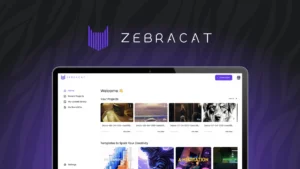The landscape of social media management has been revolutionized by artificial intelligence in 2025. Businesses that leverage these cutting-edge AI tools gain significant advantages in efficiency, engagement, and ROI. This comprehensive guide explores the most effective AI tools across major social media platforms, detailing their capabilities, pricing models, and real-world applications to help you master AI social media tools and make informed decisions for your social media strategy.
Platform-Specific AI Tools
Instagram AI Tools
Canva AI

- Key Features:
- AI-powered graphics creation
- Magic resize functionality
- Text-to-image conversion
- Brand voice consistency
- Market Position: Leading tool for visual content creation with intuitive interface
- Pricing: Free version available with basic features; premium features in paid subscription tiers
Zebracat

- Specialization: AI-powered video content creation
- Key Features:
- Professional AI voiceovers
- Seamless music integration
- Advanced visual effects
- Custom branding options
- Best For: Professional-quality video content without expensive outsourcing
SocialBee

- Core Capabilities:
- Automated content scheduling and categorization
- AI-powered optimal posting time suggestions
- Content recycling with variations
- Comprehensive analytics dashboard
- Unique Selling Point: All-in-one content management capabilities
Buffer’s AI Assistant

- Primary Functions:
- Content generation and repurposing
- Personalized post suggestions based on engagement data
- Multi-platform coordination
- Brand consistency maintenance across channels
- Integration: Seamless connection with other marketing tools
Twitter/X Platform Tools
TweetHunter

- Advanced Features:
- AI Tweet Generator with engagement optimization
- Content Calendar with predictive analytics
- Ghost Writer functionality for authentic voice
- Comprehensive Analytics Dashboard
- Best For: Growth-focused Twitter/X accounts requiring consistent engagement
Jasper AI

- Standout Capabilities:
- Social Media Templates for various content types
- Brand Voice Technology that maintains consistent tone
- Multilingual Support for global audiences
- Chrome Extension for direct platform integration
- Value Add: Time-saving content generation with brand consistency
Hootsuite

- AI-Enhanced Features:
- AI Content Assistant for platform-specific content
- Optimal Scheduling based on audience behavior
- Sentiment Analysis for audience insights
- Competitor Insights and benchmarking
- Advantage: Comprehensive management across multiple platforms
LinkedIn Tools
Supergrow.ai

- Professional Focus:
- Content Creation with personalized professional tone
- Post Scheduling optimization for B2B audience engagement
- Detailed Engagement Analytics for networking effectiveness
- Target Users: Professionals focused on thought leadership and B2B networking
HeyReach

- Networking Capabilities:
- Personalized outreach automation with natural language
- Unified inbox management for connection responses
- Follow-up sequence automation
- Differentiation: Human-like interactions at scale
Expandi

- Business Development Tools:
- Smart networking capabilities with target audience filters
- CRM Integration for prospect management
- Human-like automation with safety protocols
- Ideal For: Sales professionals and business development teams
Integration & Cross-Platform Capabilities
Cross-Platform Integration Features
The most powerful AI social media tools of 2025 offer seamless integration across platforms, providing several key advantages:
- Unified data architecture for comprehensive analytics across all channels
- Real-time data insights that reflect cross-platform audience behavior
- Synchronized content deployment for cohesive campaigns
- API integration for automated data exchange with existing marketing systems
Data Integration Capabilities
Modern AI tools excel at data integration through:
- Automated data combination from multiple sources for holistic analysis
- Comprehensive performance analysis across platforms and campaigns
- Predictive modeling based on cross-platform metrics
- Scalable architecture designed for platform expansion and emerging channels
Pricing Models & Subscription Options
Common Pricing Structures
Understanding pricing models helps businesses select the most cost-effective solutions:
Flat-Rate Pricing
- Fixed monthly or annual fee regardless of usage volume
- Predictable costs for budgeting
- Usually includes all features with potential storage limits
Tiered Pricing
- Multiple pricing levels based on features and capabilities
- Allows businesses to select appropriate level for their needs
- Often includes scaling options as companies grow
Per-User Pricing
- Cost based on number of users or social accounts
- Good for teams with clearly defined user requirements
- May include different permission levels or capabilities
Usage-Based Pricing
- Pay-as-you-go model based on actual usage
- Flexible for businesses with variable needs
- Commonly used for API calls or processing-intensive features
Freemium Model
- Basic features available free of charge
- Premium features require subscription
- Good entry point for testing capabilities before committing
Value-Based Pricing
- Pricing based on perceived value or ROI potential
- Often includes performance guarantees
- Common in enterprise-level AI solutions
Security & Compliance
Security Features
As AI tools gain deeper access to business data and social accounts, security becomes paramount:
Data Protection
- End-to-end encryption for sensitive information
- Secure cloud storage with redundancy
- Role-based access controls for team management
- Regular security patches and updates
Vulnerability Management
- Continuous security monitoring
- Penetration testing protocols
- Bug bounty programs
- Incident response planning
Threat Detection
- AI-powered anomaly detection
- Login monitoring and suspicious activity alerts
- Geolocation verification
- Account takeover prevention
Application Security
- Secure coding practices
- Third-party security audits
- API security measures
- Secure authentication methods
Compliance Standards
Top AI social media tools adhere to major regulatory frameworks:
Regulatory Compliance
- GDPR compliance for European users
- CCPA/CPRA requirements for California
- HIPAA considerations for healthcare-related content
- EU AI Act compliance for automated decision-making
Industry Standards
- Regular security audits and certifications
- SOC 2 compliance for service organizations
- ISO 27001 information security standards
- Industry-specific data handling protocols
Ethical AI Considerations
- Transparency in AI decision-making processes
- Bias mitigation in content suggestions
- Clear disclosure of automated activities
- Ethical AI use guidelines and limitations
Case Studies & Success Stories
Business Transformation
Companies achieving remarkable success through AI implementation:
E-commerce Success
- Fashion retailer increased engagement by 78% with AI-generated visual content
- Direct-to-consumer brand reduced ad spend by 35% while increasing conversions using predictive analytics
- Beauty subscription service grew subscriber base by 42% through personalized AI-driven campaigns
Marketing Optimization
- B2B technology firm increased qualified leads by 67% using LinkedIn AI tools
- Food delivery service reduced content creation costs by 50% while doubling output
- Financial services company achieved 3x ROI through targeted AI-personalized messaging
HR and Networking
- Recruiting firm decreased time-to-hire by 45% using AI networking tools
- Professional services organization expanded client base by 30% through automated relationship nurturing
- Industry association increased event attendance by 85% using personalized outreach
Implementation Examples
Rapid Deployment
- Mid-sized marketing agency fully implemented cross-platform AI tools in under two weeks
- Healthcare provider transitioned entire social strategy to AI-assisted workflow within one month
- Retail chain deployed AI content generation across 50+ local store accounts simultaneously
Strategy Enhancement
- Consumer packaged goods brand used sentiment analysis to pivot messaging, resulting in 40% engagement increase
- Travel company leveraged AI-predicted trends to position content ahead of seasonal demand
- Technology startup used competitive AI analysis to identify and fill content gaps
Engagement Improvements
- Media company increased average time on page by 2.5x with AI-optimized content
- Sports franchise grew follower interaction by 95% using AI-personalized fan experiences
- Educational institution boosted application inquiries by 65% through targeted AI-driven campaigns
User Reviews & Ratings
Review Sources
When evaluating AI social media tools, consider ratings from these trusted platforms:
Industry Review Platforms
- G2 Crowd: Peer-based business software reviews
- Capterra: Software-specific ratings and comparisons
- Trustpilot: Customer experience feedback
- Software Advice: Category-specific tool comparisons
Review Aggregators
- SourceForge: Combines ratings across multiple platforms
- AlternativeTo: Community-driven recommendations
- GetApp: Business software discovery platform
- Product Hunt: New tool discovery and user feedback
Customer Feedback Tools
- Testimonial collection software
- Case study databases
- User-generated content analytics
- Social mention monitoring
Review Management
Smart businesses employ these review management strategies:
Feedback Collection
- Automated testimonial collection workflows
- Satisfaction surveys with detailed feedback options
- User experience monitoring and improvement loops
- Feature request tracking and prioritization
Review Response
- Systematic approach to addressing negative feedback
- Highlighting positive experiences for marketing materials
- Using feedback for continuous product improvement
- Community engagement through review responses
Conclusion
The 2025 landscape of AI social media tools offers increasingly sophisticated solutions that are transforming how businesses engage with their audiences. Success in social media management now depends heavily on effectively leveraging these AI-powered tools while maintaining robust security and compliance standards.
The most successful organizations are those that thoughtfully select tools aligning with their specific platform needs while ensuring seamless cross-platform integration. When evaluating options, consider not just the features but also pricing models, security protocols, and real-world success stories that demonstrate practical applications.
As AI continues to evolve, staying informed about emerging capabilities and best practices will remain essential for marketers seeking to maximize their social media impact. This guide serves as your comprehensive resource for understanding and implementing AI tools across your social media ecosystem, helping your business make informed decisions and achieve exceptional results in 2025 and beyond.



